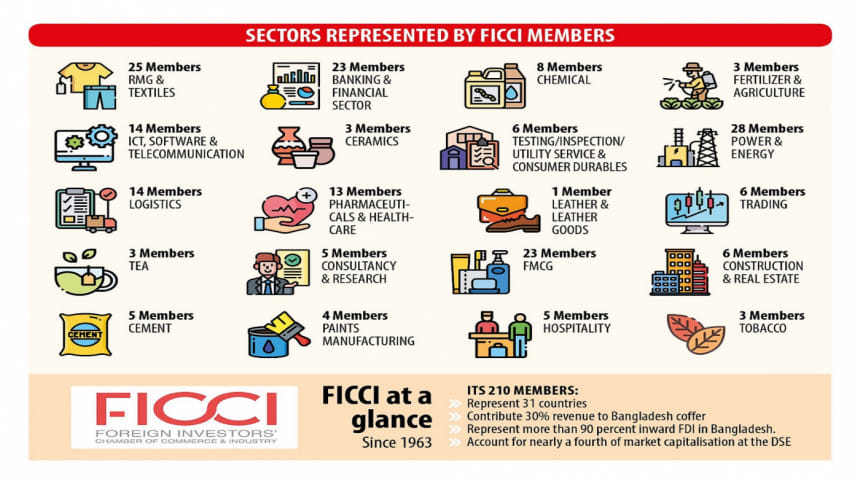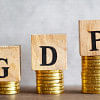Will the economy be out of the woods in 2024?

Bangladesh's economy has been passing through a challenging time for the past two years amidst growing pressure on foreign exchange reserves, the sharp depreciation of the taka and an elevated level of inflation.
And 2024 is not going to be an easier one as well. Rather, it could be another difficult year for the economy.
"But Bangladesh will be in a better position in the coming year than the outgoing year if there is no political fallout in the post-election period," said Naser Ezaz Bijoy, president of the Foreign Investors' Chamber of Commerce & Industry (FICCI), the apex body of foreign investors in Bangladesh.
This is because, he said, there will be a positive impact on the economy for the actions taken under monetary and fiscal policies.
"Inflation is easing in the West too. Stocks with western buyers are also falling. So, the decline in export orders may be arrested and it may even increase in the coming months," Naser said in an interview with The Daily Star last week.
He said the situation would be a bit better in terms of exports and there might be an improvement in remittance flows too.
He believes in the long-term potential of Bangladesh though the economy faces some challenges now.
"Near-term challenges are real but they don't define the long-term potential. Bangladesh has a compelling growth story."
Also the chief executive officer of Standard Chartered Bangladesh, Naser said the size of the economy was just $8 billion in 1971 when the country won Independence.
The economy grew to $80 billion in the first 36 years. and since 2008, it expanded three times to reach $324 billion in 2019. Bangladesh has performed better than its peers such as India and Vietnam since the Covid-19 pandemic.
"It was a difficult time but we could manage better than our peers. There was a resilience and that was primarily because of the good performance of agriculture," he said.

The aggregate growth of Bangladesh's gross domestic product was 17 percent in the three years to 2022. Vietnam's economy grew 13 percent and India registered an 11 percent expansion.
Naser took over the FICCI in early 2022, a time when Bangladesh's economy had been rebounding from the pandemic-induced losses.
Exports jumped along with import costs stemming from rising prices amid pent-up demand. Bangladesh's monthly import cost surged to $9-10 billion in the first quarter of 2022 to support increased exports and demand from domestic market-oriented industries.
But the economy's revival was short-lived because of the outbreak of the Russia-Ukraine war in February 2022 and a further spiral in global commodity prices, which sent import costs higher and compounded pressure on the current account balance, a measure of a nation's international transactions in trade and services.
The difficulty has lingered.
The taka lost its value significantly against the US dollar over the past two years though the Bangladesh Bank took several steps, including measures to discourage non-essential imports. It even sold dollars from the reserves to banks to address the forex shortage and slow the currency depreciation.
Naser, who has worked with SCB for nearly 30 years in diversified roles including in corporate banking, risk and audit in Asia, the Middle East and Africa, said the last two years have been an extremely challenging time.
"The biggest challenge was the pressure on the foreign exchange. Secondly, the depreciation of the taka affected inflation," he said.
The FICCI chief said policymakers first tried to contain and bring down inflation by increasing the supply of goods though the proven approach to curb consumer prices is to tighten the money supply.
He said the move to tackle higher consumer prices by increasing supply contributed to a spike in money flows. It, however, positively helped contain unemployment.
Besides, the measures brought down monthly imports to $5-$5.5 billion, from $9 billion two years ago.
A fall in commodity prices and a reduction in banks' ability to finance imports amid the dollar shortage contributed to the decline in imports further, according to Naser.
However, pressure still remains amid persistently higher inflation and the ongoing pressure on the external accounts, said Naser.
He said reduced imports carry some costs as the availability of an adequate volume of products might not be ensured in the future if businesses can't import required inputs to make goods and supply them to the market.
"At some point, there will be a gap between demand and supply, which will make it difficult to tackle inflation. So, we have to reach an equilibrium as neither over-import nor under-import is good."
The FICCI president said the approach adopted by the Bangladesh Bank is a good move as it plans to gradually let the exchange rate to find its equilibrium.
The central bank plans to introduce a crawling peg, a mechanism under which an exchange rate is allowed to fluctuate within a band of rates, as part of its strategy to allow the market forces to determine the exchange rate over time.
Naser says the introduction of a crawling peg will act like a benchmark as it will provide a corridor and be linked to the market. "At one point, the crawling peg might reflect the market."
"A combination of exchange rate and interest rate adjustments can bring currency stability and lower inflation."
Going forward, the country will have to ensure forex reserves equivalent to import covers of $17 billion for three months.
"For a long time, banks believed that the Bangladesh Bank will always supply US dollars to them whenever there is any shortage. But the reserves are mainly for rainy days."
"Commercial banks need to decide whether they will finance imports based on the cash flow."
The noted banker said it would be challenging to receive international supports if the reserves fall below a level that can't give coverage to imports for three months.
"If our reserves can cover import bills for at least three months and there is no political fallout, the impacts of monetary policy measures will be felt positively in the economy."
"However, the recovery from the current economic difficulties is going to be a painful process. And all, including businesses, have responsibilities here."

 For all latest news, follow The Daily Star's Google News channel.
For all latest news, follow The Daily Star's Google News channel. 








Comments